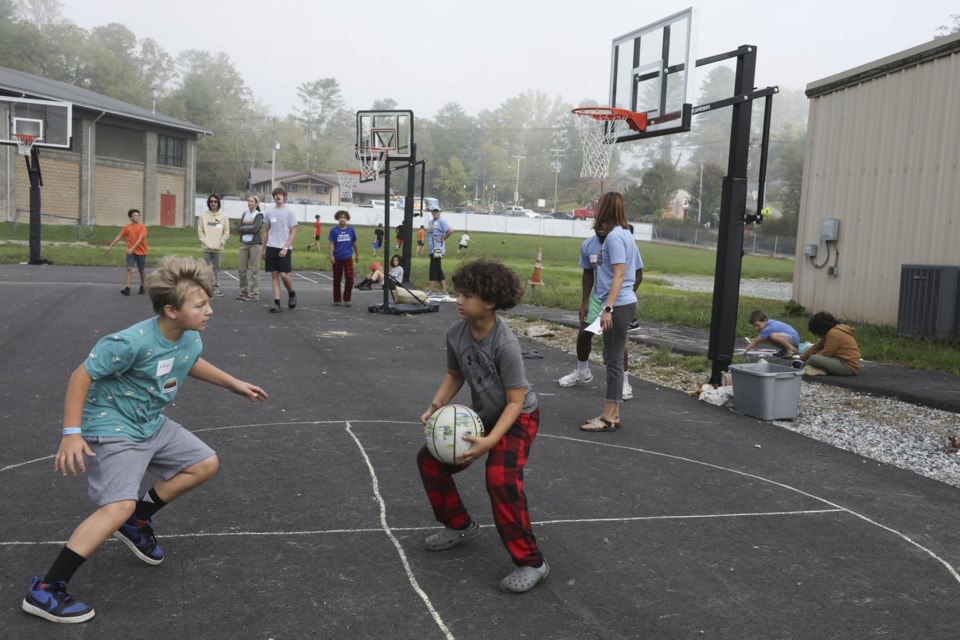BREVARD, N.C. (AP) — The Weissmans still have much to do to recover from Hurricane Helene flooding their home last month.
They need to chase down private insurance claims and fill out applications for the Small Business Administration and the Federal Emergency Management Agency. Because the storm killed power to western North Carolina, they worry about mold.
The storm also wrecked Max Weissman's office, leaving the 45-year-old therapist with nowhere to meet patients. And it leveled the building that housed the tea company where his wife, Aviva Weissman, worked.
But the Weissmans haven’t had time to deal with any of that because like all parents their utmost priority is their children. Schools have been closed since the storm and their son Avi, 11, helped Max bleach the basement last week. Aviva briefly took their 7-year-old daughter Reyna to stay with family in South Carolina before returning home.
Like all children, both now need a routine, and to play.
On Monday morning, Weissman took Avi and Reyna to a free, pop-up day camp where dozens of kids were making bracelets, drawing, and playing oversized games of Jenga and Connect Four in a large playroom. Outside, girls bounced through a hopscotch court as a fierce basketball game heated up behind them.
The camp is hosted by the the LA-based nonprofit Project:Camp. As storms become more frequent and severe, the organization is increasingly traveling to disaster-affected communities to set up spaces where kids can process the disruption and devastation of a disaster while their parents start the long recovery process.
“I feel pretty guilty telling them all the time, ‘I’ve never dealt with this,’” said Weissman. “‘This is the first time we’re dealing with a pandemic. This is the first time we’re dealing with a flood.’ And I feel like it just keeps on.”
He lingered outside the playroom, anxiously peering through the window to check on the kids as he responded to messages from his patients.
The Brevard camp opened Monday and will run until Friday. Schools here are expected to open next week. Project:Camp is talking with nearby communities about where to set up next.
Schools can’t reopen until water is restored. For some counties, it’s still unclear when that can happen.
As of Tuesday, 15 school districts and the majority of the 21 charter schools in the region impacted by the storm remained closed, according to the state’s Department of Public Instruction. Three districts are set to resume classes Wednesday, with more to follow next week.
With Hurricane Milton approaching Florida, Project:Camp was also preparing for the possibility it would be needed there, too.
“It’s always been the case that there’s a lack of this,” said Dr. Irwin Redlener, founding director of the National Center for Disaster Preparedness at Columbia University and an adjunct professor of pediatrics at the Albert Einstein College of Medicine. “As quickly as possible, we have to begin reestablishing some level of post-disaster normalcy for children ... The necessity for play should not be understated,” he said.
Project:Camp volunteers are trained in trauma recovery. Kids participate in gratitude circles, refocusing them on positive thoughts, and do mental and emotional checks, or “Me” checks, where they rate how they feel and learn to assess their own wellbeing.
They also just have fun.
“Camp is an inherently therapeutic space for kids,” said Henry Meier, director of external affairs at the organization and leader of the Brevard pop-up. “They process through play, they process with their peers. So just having a space that they recognize, that they feel safe and comfortable in, is the best environment for them right now.”
On Tuesday morning, the Weissmans returned to Project:Camp. Max looked more relaxed. He’d gotten some things done, and the power was supposed to return that day.
When he'd picked up the kids the evening before, Reyna told him it was the “best camp ever.” Avi said it was OK, but that was enough for Max.
“In 11-year-old language," he said. "That means it was fantastic.”
___
Associated Press writer Gary D. Robertson contributed reporting from Raleigh, North Carolina.
___
Associated Press coverage of philanthropy and non-profits receives support through the AP’s collaboration with The Conversation US, with funding from Lilly Endowment Inc. The AP is solely responsible for this content. For all of AP’s philanthropy coverage, visit https://apnews.com/hub/philanthropy.
Gabriela Aoun Angueira, The Associated Press



